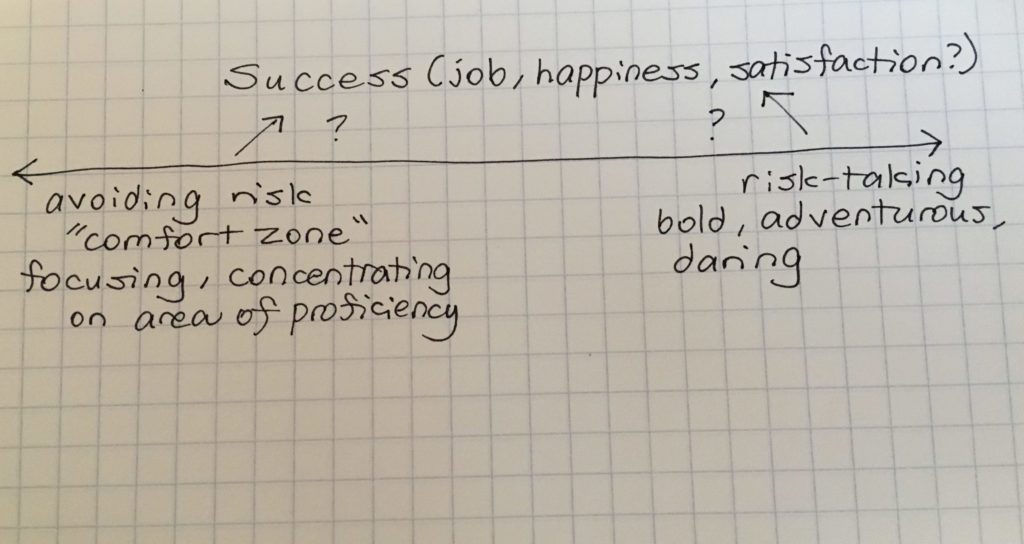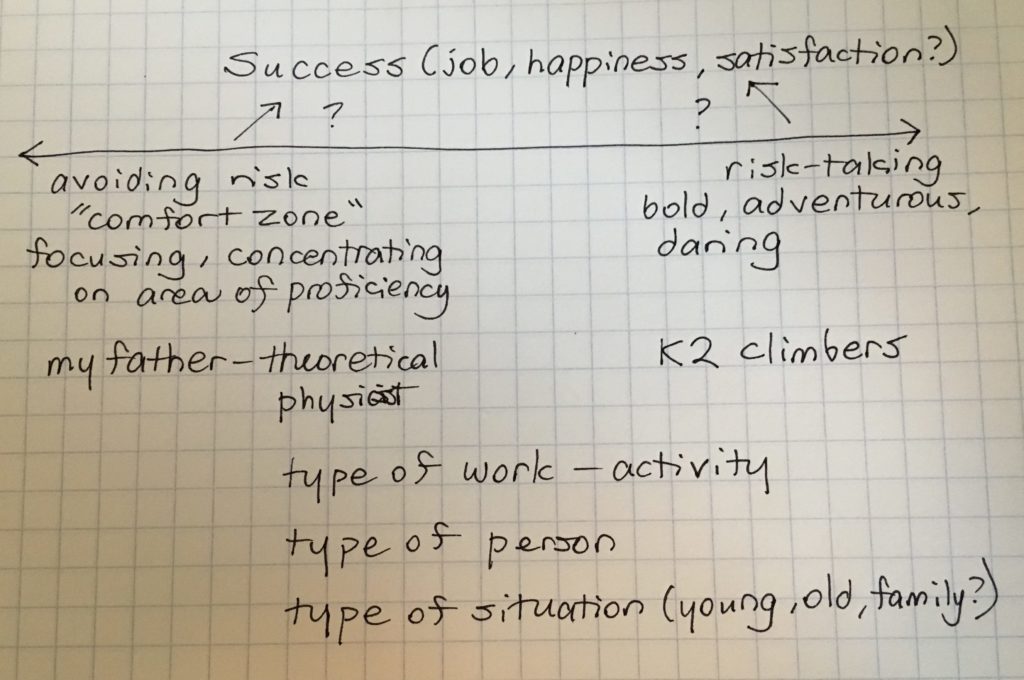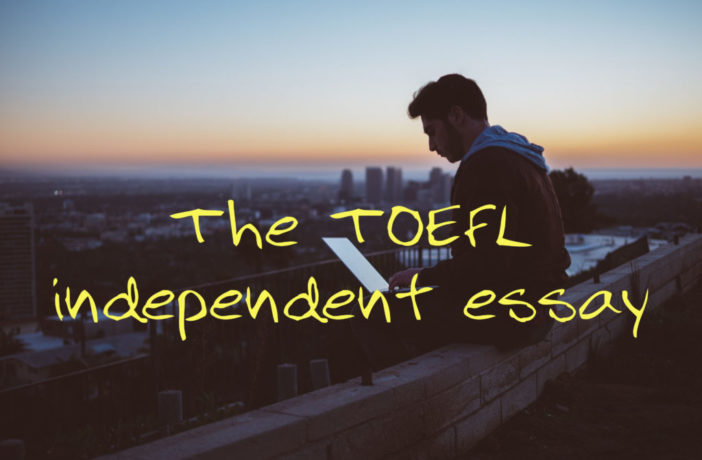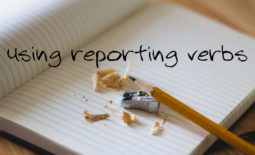The TOEFL independent essay
How do you write a good TOEFL Writing independent essay … good enough to get a score of 4 or 5? What I’ll do in this article is show you the process I use to write an essay, with a lot of tips along the way.
♥ ♥ ♥
Essentially, the independent writing task follows the organizational structure of what teachers call “the five-paragraph essay.” The five-paragraph essay consists of:
An introductory paragraph. This contains your thesis statement … your main idea, which you will elaborate on in subsequent paragraphs. Rather than a wordy, rambling introduction, aim for two or three clearly written sentences that accurately and succinctly describe your thesis. The goal of this paragraph is to communicate very clearly to your rater what you’re going to be writing about in the rest of your essay.
Three body paragraphs. Most independent writing tasks will ask you your opinion about a topic. It is preferable to have three main points. Each point should be expanded upon in its own paragraph. The first sentence in each paragraph should be your topic sentence; it will clearly state the main idea of this paragraph. The rest of the paragraph will provide support for that idea. I have more to say about those three points in this article.
A concluding paragraph. One or two sentences restating your thesis are sufficient.
♥ ♥ ♥
In the independent writing task, you are given the topic and the timer starts counting down: 30 minutes from start to finish. Here’s the topic (TPO 20):
Do you agree or disagree with the following statement?
Successful people try new things and take risks rather than only doing what they know how to do well.
Use specific reasons and examples to support your answer.
♥ ♥ ♥
The first thing I do is to make sure I understand the question. It’s talking about what leads to success: risk-taking or sticking to what you do well. I might even illustrate this in my notes, which I’ll use before I start typing.

Notice that I’m already starting to accumulate some words or phrases that I may use in my essay.
TIP: Don’t start writing immediately! A few minutes to organize your ideas will pay off in multiple ways. Your essay will be clearer, more coherent, more focused, and easier for your rater to read.
♥ ♥ ♥
Now I need to develop a few ideas about the question: these will help me establish my stance – do I totally agree, completely disagree, or have mixed feelings?
TIP: It’s absolutely okay and often preferable to write an “it depends” essay. I have lots to say about this in this article. Unless you feel really strongly one way or the other, an “it depends” essay will reflect your own attitudes more accurately and, in my opinion, the most important objective in the whole essay-writing process is to say what you really think and believe.
♥ ♥ ♥
I finish up my written notes (what I would consider brainstorming) by jotting down a few preliminary ideas from my own experiences – an example of my father (not a risk-taker but a success in his profession) and some books I’ve been reading on risk-taking climbers who tried to ascend K2, the “savage mountain” in Pakistan. A bit of thought leads me to the conclusion that success comes a variety of ways, so it will depend on factors like the type of work or activity, the type of person, and maybe the type of situation the person is in.

TIP: My advice for TOEFL independent writing is the same as for independent speaking. Where do you find ideas and examples? From inside yourself. From your own experiences, your own viewpoints, your own examples. What’s really real for you is what you know best. From this reality will come the details and vocabulary you need to respond more effectively, no matter what you have to say.
♥ ♥ ♥
I’ve spent a few minutes thinking about the topic, gathering ideas, and figuring out my general approach. Now it’s time to start typing. But I don’t start off just typing the first thing that comes into my head. Instead, I type a bit of an outline, like this:
Thesis: Taking risks is sometimes necessary, but it’s not the only way to achieve success.
- To succeed in some types of work, you must focus on and master one particular thing. (father)
- Some types of work/situations are inherently risky, so people need to take risks to succeed. (climbing mountains, venture capitalism)
- The degree of risk you take depends on the type of person and the situation. (personality, age of person, family circumstances)
TIP: According to TOEFL Writing raters I have spoken to, it’s best to write five paragraphs: an introduction, three body paragraphs, and a conclusion. If you aren’t a strong writer, those three body paragraphs may be fairly short. As long as your topic sentence is clear and you provide a few supporting details, in at least two subsequent sentences, you should be fine.
TIP: Having trouble coming up with three ideas? Think about how you might divide one idea in half. Maybe you are writing an essay supporting children wearing school uniforms and you can only come up with two points: 1) schoolchildren feel less peer pressure to be fashionable and 2) it’s easier for parents. Maybe you could divide the second point in half. One new point is that parents save money. Another new point is that parents will waste less time getting kids ready for school in the morning. Now you have three different points for your essay.
TIP: Take the time and make the effort to organize your ideas and structure your essay before you start writing. Never start writing without knowing what you’re going to say! The most important thing you can do is to make your essay easy for your rater to read and understand. Lots of words on the paper without a clear, coherent structure behind them is going to give your rater a headache and they, in turn, will give you a lower score.
♥ ♥ ♥
Here’s my finished essay.
Great adventure stories always feature heroes and heroines who are bold, daring, and fearless. Taking risks is inherent to the drama, and that’s what makes the story so compelling. However, while risk-taking may sometimes be praiseworthy and even necessary to succeed, I believe there are many times when it’s preferable to avoid risks, stay in one’s comfort zone, and achieve success without going to extremes.
First of all, many jobs require focus and concentration on one area of expertise, rather than risk-taking and trying new things. Work that is highly specialized and technical may be so difficult that success only results when people remain in their particular area of proficiency. For example, my father, a theoretical physicist, spent virtually years and years exploring just a few extremely complex and challenging problems that no scientists had yet solved.
On the other hand, some jobs, activities, or situations are inherently dangerous and cannot be completed successfully without people taking risks. These risks may be physical; mountain climbers trying to ascend Mount Everest or K2, for example, know that despite careful planning and extensive physical training, they will encounter many dangers during these pursuits. Or the risks may be monetary. Few stockbrokers or venture capitalists achieve financial success without taking risks with their investments.
All in all, whether it’s better to take risks or play it safe really depends on a person’s individual characteristics and their situation. While some people thrive on taking risks, others prefer to focus on activities and tasks that they feel comfortable doing. Both types of people are equally capable of becoming successful in their jobs or personal lives. Furthermore, as people’s circumstances change, they may feel like taking more or less risks. Young adults tend to feel more adventurous, for example, while married couples with young children may opt for more security.
So although we may enjoy reading stories about great risk-takers and adventurers, explorers and visionaries, in real life, most of us recognize that for many people and in many situations, there’s nothing wrong with sticking to the known and familiar. However we define success, whether in our jobs or the pursuit of happiness, there are many roads to its accomplishment.
♥ ♥ ♥
TIP: Many students are told that, in their introduction, they should start with a “global,” very broad statement and include all the possible choices from the topic. An example from one of my students:
People will set up different goals for new year’s resolutions. Some people consider their health as the most important task in their life, while others put time management in the first place. In my opinion, I will choose to help others in my community to be my new year’s resolution.
This is not my preference. In this essay, I chose to talk about literature that features risk-taking because I had just finished reading a book about climbing K2, the most dangerous mountain in the world. But I might also have started with a briefer introduction, for example:
Being bold and adventurous, taking risks and trying new challenges may certainly but not always lead to success. However, I believe there are many times when it’s preferable to avoid risks, stay in one’s comfort zone, and achieve one’s life goals without going to extremes.
I have two main goals in my introduction. The first, which is mandatory, is to make sure the reader understands my thesis and what I’m going to talk about in the rest of the essay. The second, which is optional but definitely preferable, is to make the reader interested in what I’m going to say. Imagine a rater reading essay after essay after essay. Do you want their eyes to glaze over or do you want to capture their attention? A good writer always aims for the second reaction.
TIP: Students are also often told that they should avoid using the first person, “I.” I disagree. If you are asked your opinion, it’s natural to use “I.” But when you use different persons (first, second, and third) in your writing, be sure that you make conscious, careful decisions about which to use. Notice that in my essay, I generally stick with the third-person, but occasionally switch to the first (I and we). Be careful not to switch randomly, especially between the second and third person. An example of what to avoid:
Students should be allowed to choose what type of room they want to live in at college. You might find it enjoyable to have a roommate, but some students like living alone. Independence is usually important when you go to college, so students should be allowed to live in a single room if they want.
TIP: Long essays are not necessarily better essays. Although less fluent writers will find it impossible to produce a lengthy essay, length alone will not necessarily guarantee a high score. My essay is 364 words, far fewer than some of my students’ work. I wrote fewer words, but I took more time organizing my ideas in the beginning, choosing my words and structures with care, and proofreading my work at the end. I recommend that you do the same. And although I once had a student whose teacher recommended initially writing about 500 words and then paring them down to about 400, I definitely don’t use that approach. I think it’s far better to spend your time organizing your ideas and carefully crafting your sentences so they don’t need to be deleted or extensively rewritten.
TIP: Keep your conclusion short and sweet. Go back to your introduction. Rephrase it and, if possible, recapture the idea that (hopefully) intrigued your reader in the beginning. For example, in my conclusion, I reiterated the idea of adventure stories.
TIP: Don’t feel that you need to write your essay “in order.” After I write down my thesis statement and the topics of my three body paragraphs, I often skip the introduction and go to the first body paragraph. It’s sometimes easier to introduce the essay when I already know what I’ve said in its body.
TIP: Always save time at the end to proofread your work. So many students’ essays that I read suffer from unnecessary language use problems (subject/verb disagreement, improper tense, incomplete sentences), punctuation mistakes, weak vocabulary or word form errors, and misspelling. I say “unnecessary” because the students, when they reread their work, recognize the errors without my pointing them out. Although your essay doesn’t have to be perfect to get a top score, you want to avoid as many of these mistakes as you can. Far better to keep your essay on the shorter side, and leave enough time to make as many corrections as you can in the last five minutes. Reading your essay aloud (in your head) may help you to identify these mistakes more easily. Error correction is also a useful skill that you can work on when practicing by yourself.
TIP: Each of your main points needs to be developed and elaborated upon. This is the “meat” of your essay, and it’s what raters will focus on. Avoid using vague reasons (“I will learn more knowledge”), unsubstantiated information (“research shows” or “the Dalai Lama says”), or trite and over-used expressions (“enhance my social skills” or “broaden my horizons”). It is much better to support your reasons with personal and authentic examples. Raters can usually tell when you are making up a story about yourself or “my friend Kenny.” Good English writing has its own “voice” … it’s genuine, not fake; individual, not generic; specific, not vague.




